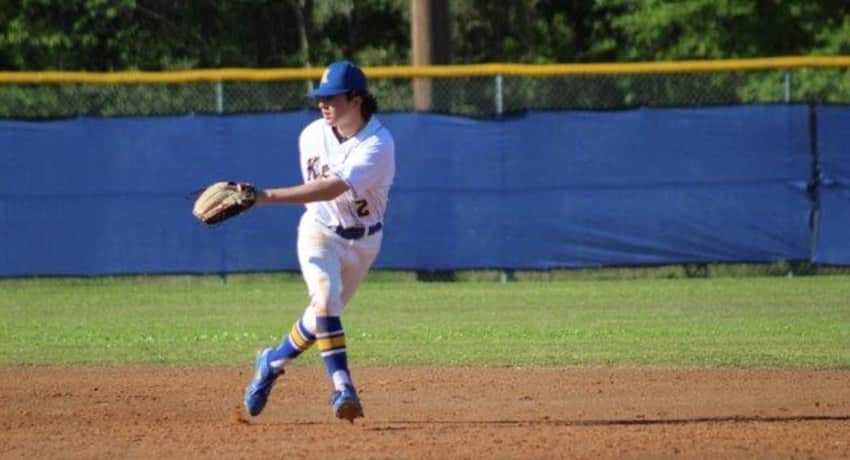Since he was seven years old, Jason Guidry has spent a lot of time on the baseball field. Now playing for his high school team, running drills at practice was nothing new for him, until one day when a ball intended for second base hit him in the back of his head.
“I wasn’t aware of what was about to happen. The pain was indescribable. It didn’t hurt, but I have no way to explain how it felt in that moment,” said Jason.
When he stood up, he knew something was wrong when his vision become impaired. Jason called his mother, who was in Louisiana at the time, over two hours away.
“When I got the call, I jumped in my car and headed back to Texas. Jason never wants to go to the doctor, so I knew something was wrong,” said Penni, Jason’s mother.
Fortunately, Jason’s dad, Drew, was running errands nearby and was able to rush him to the emergency room.
After hours of scans and tests, it was confirmed that Jason was suffering from an epidural hematoma, bleeding between the inside of his skull and the outer layer that covers his brain.
Due to his age, Jason was transferred to a children’s hospital in Houston for specialized care. Surprising his parents and medical staff, he never lost consciousness even though he was in considerable pain.
After testing and being monitored, Jason’s brain hemorrhage was not getting worse – which was great news. However, his eyesight was not improving. An ophthalmologist quickly diagnosed him with homonymous hemianopsia, a condition where an individual can only see on one side of each eye. Jason’s vision was limited to the right side of each of his eyes.
Sometimes congenital, homonymous hemianopsia is usually caused by a brain injury.
“When looking at himself in the mirror, Jason told me how weird it was that he could only see half of his face. My heart sank. I thought he had just lost his peripheral vision. I didn’t understand,” said Penni.
An expert referral

Sustaining a traumatic brain injury (TBI) meant Jason needed to add one more specialist to his medical team. His athletic trainer and baseball coach knew just the provider to refer him to, Summer Ott, PsyD, neuropsychologist with UT Physicians.
Ott, who is also an assistant professor in the Department of Orthopedic Surgery at McGovern Medical School at UTHealth, is accustomed to sports-related concussions as she currently serves as the team neuropsychological consultant for several professional sports organizations in Houston.
After an evaluation, Ott was impressed with how far Jason had come in just a few days.
“Considering the nature of his injury, he was doing remarkably well when I first saw him. Typically, patients may report memory problems, inattention, headaches, dizziness, or even mood changes after a similar injury,” said Ott.
With pediatric TBIs, there’s always some additional worry.
“Every TBI is serious, and the symptoms in adults and children are quite similar. However, the concern we look at is the functional impact of the injury on a child, as the adolescent brain is still developing,” said Ott.
An assessment revealed that Jason was suffering from visual field defects, visual convergence difficulties, and balance instability. However, there was some good news – Jason’s vision was improving each day.
Disappointed that his test didn’t go as well as he hoped, Jason still thought his first meeting with Ott was a positive one. Penni remembers that appointment with Ott and the hope she gave them.
“Dr. Ott was very knowledgeable and comforting to us. She was straightforward, did a thorough evaluation of Jason, and explained her findings,” said Penni.
Eager to get back to school and his friends, Jason was prescribed a treatment plan that would help him transition back to a somewhat normal life. In school, he was only allowed to take a limited amount of quizzes and exams, he was assigned reduced homework, and had access to preprinted class notes. After a concussion, mental rest is extremely important to help the brain heal.
At home, Penni and Drew enforced quiet time, low lighting, and regulated screen time – all efforts to reduce Jason’s symptoms and negate light sensitivity. They also were advised by Ott to monitor Jason for any acute stress symptoms, depression, or anxiety.
Physical therapy was arranged to address lingering balance issues, visual tracking difficulties, and mild neck pain.
Recovery
After one month of gentle reminders from his parents and support from friends, Jason was reassessed. Although he was experiencing some of the same symptoms, they were significantly less severe. Ott’s testing of his neurocognitive abilities showed substantial improvement and functioning.
“I felt like my treatment was never-ending, but as I got better and my vision returned, I became grateful,” said Jason.
Satisfied with how far he had come in a short time, Ott released Jason to the rest of his medical team with a few remaining adjustments to allow him to return to school full time, while still ensuring that his symptoms remained low.
“In my opinion, there were several factors that led to Jason’s impressive recovery,” said Ott. “Having immediate post-injury assessment and identification of his brain hemorrhage, management by a multidisciplinary team, compliance with treatment recommendations, and a great social support system were all critical to him returning to sports and school.”
Today, Jason feels normal again. He’s back to exercising, schoolwork, and even driving. With enough time passed, he’s learned to look back on this difficult time with some humor.
“This incident will make a great college essay,” said Jason. With excellent grades and extracurricular activities under his belt, Jason plans to attend university after high school.
“For anyone going through something similar, don’t give up and trust the process,” said Jason. “It is a long and hard recovery, but it’s worth it in the end. I’m not going to take life for granted.”



